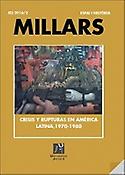Encrucijada de guerra en mujeres peruanas: Augusta La Torre y el Movimiento Femenino Popular
Contenuto principale dell'articolo
Abstract
Augusta La Torre (second-in-command of the Communist Party of Peru-Shining Path (PCPSP) formed in 1970) founded the Women’s Popular Movement (WPM) in the 1960s. This marked the beginning of a type of “proletarian feminism” which took its inspiration from Marx, Engels, Mao and Mariátegui. It is radically different from and opposed to other Peruvian popular women’s movements of that time. This paper traces the history and the role of the WPM in the context of the national peasants’ and workers’ social movements of the 1960s, and the “armed struggle” waged against the Peruvian State from 1980 to 1992. The article makes an epistemological break in order to attempt to come to a counter-hegemonic understanding of the history of the women of Shining Path.
Augusta La Torre (second-in-command of the Communist Party of Peru-Shining Path (PCPSP) formed in 1970) founded the Women’s Popular Movement (WPM) in the 1960s. This marked the beginning of a type of “proletarian feminism” which took its inspiration from Marx, Engels, Mao and Mariátegui. It is radically different from and opposed to other Peruvian popular women’s movements of that time. This paper traces the history and the role of the WPM in the context of the national peasants’ and workers’ social movements of the 1960s, and the “armed struggle” waged against the Peruvian State from 1980 to 1992. The article makes an epistemological break in order to attempt to come to a counter-hegemonic understanding of the history of the women of Shining Path.
Augusta La Torre (second-in-command of the Communist Party of Peru-Shining Path (PCPSP) formed in 1970) founded the Women’s Popular Movement (WPM) in the 1960s. This marked the beginning of a type of “proletarian feminism” which took its inspiration from Marx, Engels, Mao and Mariátegui. It is radically different from and opposed to other Peruvian popular women’s movements of that time. This paper traces the history and the role of the WPM in the context of the national peasants’ and workers’ social movements of the 1960s, and the “armed struggle” waged against the Peruvian State from 1980 to 1992. The article makes an epistemological break in order to attempt to come to a counter-hegemonic understanding of the history of the women of Shining Path.
Downloads
I dati di download non sono ancora disponibili.
Dettagli dell'articolo
Come citare
Guiné, A. (2016). Encrucijada de guerra en mujeres peruanas: Augusta La Torre y el Movimiento Femenino Popular. Millars. Espai I Història, 23(41), 97–128. Recuperato da https://www.e-revistes.uji.es/index.php/millars/article/view/3238
Sezione
DOSSIER


